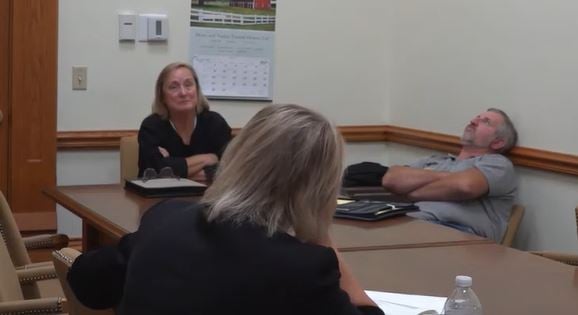Shelby Co. (ECWd)- Shelby County Board member Teresa Boehm is the subject of the Quo Warranto filing by the Shelby County State’s Attorney as outlined in this article. Thomas O. Finks, the attorney representing Boehm, filed a motion to dismiss the case on August 8th at 9:18 AM claiming it was moot since Boehm had
Shelby Co. (ECWd)-
Shelby County Board member Teresa Boehm is the subject of the Quo Warranto filing by the Shelby County State’s Attorney as outlined in this article.
Thomas O. Finks, the attorney representing Boehm, filed a motion to dismiss the case on August 8th at 9:18 AM claiming it was moot since Boehm had allegedly resigned from the Rose Township Cemetery Board of Trustees. He then filed an amended motion a few hours later.
What did Finks miss in his motions to dismiss?
“In the case at bar, Defendant failed to cite to any authority in Defendant’s Motion to dismiss. Such a position is an underdeveloped argument. Underdeveloped arguments are waived. Id. When a party does not offer meaningful authority in support of his argument, that argument is forfeited.” Henry v. Waller, 2012 IL App (1st) 102068, ¶ 47, 975 N.E.2d 93, 363 Ill. Dec. 291.
Under Henry v Waller, the absence of any authority in Defendants motion constitutes a waiver of Defendant’s arguments.”
We find it odd that such readily available case law cited in the response appears to have been overlooked or ignored by Finks. Had such a review been done it could have possibly saved Boehm unnecessary legal fees for a filing that should fail based on the law. It’s clear from the case law that Finks’s motion to dismiss shouldn’t be granted. A few of those cited are most interesting to read.
- People ex rel. Courtney v. Botts – Supreme Court of Illinois -April 10, 1941
- People ex rel. Ballard v. Niekamp – Appellate Court of Illinois, Fourth District – September 19, 2011allard
- People ex rel. Rahn v. Vohra – Appellate Courto inci, Second District – September 29, 2017
It also appears Finks may have failed to ensure Boehm’s constitutional rights of self-incrimination are protected.
“In this case, Defendant’s counsel advances a sworn statement by the Defendant despite the potential criminal liability to the Defendant. Proper admonishments by the trial court help to ensure that a defendant understands her rights and the consequences of any decision to waive those rights.”
The subject of a proper admonishment came up during the initial hearing and it was evident Finks had no clue why this was so important for his client. The State’s Attorney has a duty to protect the defendant’s constitutional rights and, in this case, appears to be doing exactly what he took an oath to do.
“As a preliminary matter, even if defense counsel is not going to protect the Defendant’s constitutional rights, the State’s Attorney, in his official capacity, is the representative of all of the people, including the defendant, and it is as much his duty to safeguard the constitutional rights of the Defendant as much as any other citizen. See People v Cochran, 313 Ill. 508, 526 (1924). See also Berger v United States, 295 U.S. 78, 88; 79 L.ed. 1314, 55 S.Ct. 629, 633 (1935). In this case, defense counsel advances a sworn statement that may establish the Defendant committed a class 4 felony. For this reason, the State’s Attorney asks this Court, to provide the criminal admonishment to the defendant so as to ensure that the Defendant has been advised of her constitutional right against self-incrimination that is not being protected by defense counsel.”
“A reasonably prudent attorney representing a defendant facing a quo warranto typically seeks to protect the Defendant from the pitfalls of opening one’s mouth. Nevertheless, in this case, Defense counsel has abandoned the primary function of defense counsel ignoring the possibility that the Defendant could be charged with a felony.”
Within the response is information pertaining to what we believe is illegal compensation to Boehm as a Township Cemetery Board member. Recently obtained records indicate those members are getting paid however we have found no provision for those members to be compensated. The filed response is now asking for a fine of $2,100.00 whereas the initial fine sought was only $100.00.
The records we obtained reflect she was paid $72.83 each month for the first seven months of the year. The minutes obtained reflect the Township Board set the wage at $1,000.00 a year.
While some have stated the original $100.00 oral motion for a fine was not granted, such an assertion leads people to believe an action was taken on that matter. The $100 fine originally sought was supposed to be taken up at the next hearing, so no, it was not granted during the last hearing, nor was it denied as some may be led to believe when they are told the request was not granted. With the new facts in the case, the fine has increased, and rightfully so in our opinion.
While the courts have full discretion on the matter, it would appear nothing less than the wages paid would be appropriate in light of there being no reference to any authorization for compensation for township cemetery board members that we have found to date. If anyone locates any such authority, please send it our way for publication.
A copy of the State’s Attorney’s response can be downloaded at this link or viewed below.



























Leave a Comment
Your email address will not be published. Required fields are marked with *